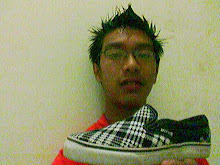THE Associated Press' Vienna bureau chief, William J Kole, wrote an interesting account of how Barack Obama's victory suddenly made it "cool" to be an American again.
A few hours after the newsbreak, Kole received a peck on the cheek from a stranger, a young Austrian woman who overheard him speaking English on the bus. Kole went on to say how an American colleague in Egypt were hailed with "America, hooray!" by strangers while another American in Amman said some Jordanian women stopped her on the street to describe to her how they wept with joy over Obama's election.
It was a change to how Kole and many Americans outside their countries had previously been treated when the United States had antagonised so much of the world.
Following reports of abuses wrought by US troops at the detention centre for suspected terrorists at Guantanamo Bay in Cuba, for instance, Kole had to pretend he was a Canadian in front of his indignant, Muslim taxi driver. He also had to teach his children, who came of age in Europe, and in a hostile post-9/11 world, "to avoid being too conspicuously American".
Kole was describing the sentiments that so many Muslims around the world had been feeling whenever they encountered matters that were related to the US and its allies and their "war on terror".
There have been too many accounts of Muslims around the world being treated like the world's pariah for the eight years of George W Bush's administration.
One of the sharpest observations, however, could be the one made by a British Muslim journalist about how Muslims were "under suspicions from cradle to grave" because the "war on terror" proponents have gone as far as instructing teachers to monitor children as young as five years old as potential terrorists.
Kole's main point was that Obama's election might just bring about the needed change even for Americans so they would no longer have to hide their identities.
American Muslim leaders who supported Obama have basically expressed the same hope for change. An American Muslim scholar, Syaikh Yasir Qadhi, wrote in the wake of Obama's victory that when Americans voted, "they voted not for Barack, but against the current administration".
"Obama is no messiah, and...he will inevitably do things that will enrage people around the world, and yes, sometimes even us. But looking at the alternative he was the better candidate overall, at this time and place, for Muslims, for America, for the world.
And if it turns out that those who voted for Barack Obama were wrong, well, they can say, in full conscience...'O Allah, this is what was apparent to us when we chose, and only You knew the future and what it held."
Muslims in Britain have expressed similar sentiments. An editorial of The Muslim News welcomed Obama's victory saying it looked forward to a fresh approach to American policies especially in the Middle East.
"Even though Obama portrayed the traditional American bias towards Israel, he devoted much time on peace and justice," said its editor Ahmed J Versi.
What about the more than 0ne billion Muslims in the rest of the world? In Palestine, Iraq, Afghanistan, Pakistan, Chechnya, Kashmir, Mindanao, Pattani and many more places. How much of a hope should they hold out for?
Yasir Qadhi has pointed out that Muslims, especially those in the US, should not be "guilty of hope". So yes, of course, we should hope for a change for the better with the latest developments in America.
But eventually Muslims should never forget that their trust, hopes and ambitions rest solely with Allah.
Another American Muslim scholar, Suhaib Webb, said, "The worst thing we can do is to idolise Obama. This would undermine our unique ability to call him to account on issues and examine him with a critical eye and, at the same time, afford him the elastic to err and grow."










No comments:
Post a Comment